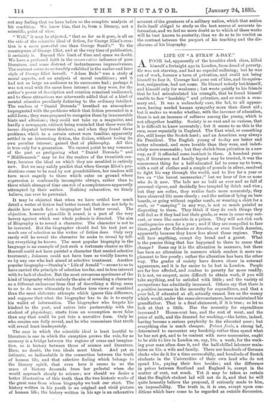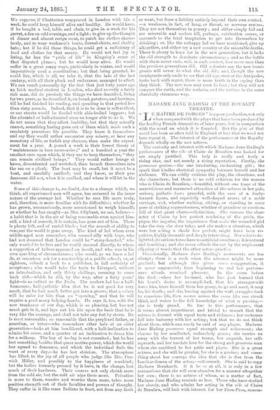LIFE ON "A STRAW A-DAY."
APOOR lad, apparently of the humbler clerk class, killed himself a fortnight ago in London, from dread of poverty. He was not starving, and had no especial suffering; but he was out of work, foresaw a term of privation, and could not bring• himself to face it. Courage had gone out of him, and its equivalent, resignation, had not come. He blamed nobody but himself, and himself only for weakness ; but wrote quietly to his friends that he had miscalculated his strength, that he found himself unable to face " hardship " and privation, and so made a summary end. It was a melancholy case, the lad, to all appearance, having needed human sympathy more than direct aid ; but it makes us wonder whether, with the increase of education,. there is not an increase of softness among the young, which is not altogether healthy. Society is so vast and so various, that it is difficult to know accurately; but it seems to us this is thecase, more especially in England. The East wind, or something else, still keeps the Scotch hard ; and an American may always die President. The English young of to-day are better and better educated, and more lovable than they were, and indefinitely more reasonable ; but they shrink-from privation in a new way, as if it offended some instinct in them. A hundred years ago, if literature and family legend may be trusted, it was the commonest thing for a half-educated lad to come up to town, with a suit of clothes and a couple of pounds in silver, resolved to fight his way through the world, and to live for a year or two on "the barest necessaries ;" but we hear of few or nonewho do it now. The lads are as bold as ever and as full of personal vigour, and decidedly less tempted by drink and vice ; but they are softer, they realise facts more accurately, they have observed life more closely; and the notion of lying on baseboards, or going without regular meals, or wearing a shirt for a week, or " camping " in any way, is not so much painful as disgusting to them. They think if they do such things they will feel as if they had lost their grade, or were in some way outcast, or were like convicts in a prison. They will not risk such contingencies even for a year ; and if they are compelled to face them, prefer the Colonies or America, or even South America,. apparently because they know less about those regions. They will face anything, except dry bread and a garret. What is the precise thing that has happened to them to cause that change ? Some say it is the alteration in manners, but therehas been no alteration in manners which renders it more unpleasant to live poorly; rather the alteration has been the other way. The grades of society have drawn closer in external appearance, and it is far easier to be lost in London. Peopleare far less affected, and confess to poverty far more readily. It is not, we suspect, more difficult to obtain work, if you will take anything, and be satisfied with little ; and the variety of occupations has admittedly increased. Others say that there is a positive increase in the necessity for expenditure, and that a poor lad, if educated at all, actually cannot live on the money which would, under the same circumstances, have maintained his grandfather. That is a final statement, if it is true ; so let us look at that a little. Has the necessity for expenditure increased? House-rent has, and the cost of meat, and the price of milk, and the demand for washing,—the latter, indeed, having become a serious perplexity to the educated poor; but everything else is much cheaper. Prima facie, a strong lad, determined to encounter any hardship rather than spend what he has not got, and to be content with mere necessaries, ought to be able to live in London on, say, 103. a week, for the working poor man often does it, and the half-skilled labourer maintains on 15s. a wife and family. There are hundreds of German clerks who do it for a time successfully, and hundreds of Scotch students in the Universities of their own land who do not spend 15s., paying their fees besides ; and the difference in prices between Scotland and England is, except in the matter of rent, not much. Yet it may be taken as certain that the English student lad will not do it, and that be will quite honestly believe the proposal, if seriously made to him, an impossibility. The truth is, it is one, except upon conditions which have come to be regarded as outside discussion.
We suppose, if Chatterton reappeared in London with 12s. a week, he could keep himself alive and healthy. He would have, if he bought a bed, table, and chair, to give 5s. a week for his garret, a fire on cold evenings, and alight; to give up the thought of dinner and almost resign meat, to patch his clothes shamelessly, and to wear workmen's boots, flannel-shirts, and shabby hats ; but if he did these things, he could get a sufficiency of food and clothes for that money. He would not feel joy in living, far less the "pride of life" in Kingsley's sense of that disputed phrase ; but he would keep alive. He would suffer in a great many ways, particularly in winter, and would imperatively need a constitution ; but that being granted, he could live, which is all, we take it, that the lads of the last century, with all their pluck and endurance, managed to effect. We can vouch personally for the fact that just forty years ago an Irish medical student in London, who died recently a fairly rich man, did do precisely the things we have described, living for two years, as he described it, on bread, potatoes, and herrings, till he bad finished his reading, and spending in that period less than sixty pounds. Indeed, that it is to be done is self.evideut, or our streets would be flooded with able-bodied beggars ; but the educated or half-educated seem no longer able to do it. We do not mean that they affect inability, but that they actually cannot, something having gone out of them which made such a resolutely penurious life possible. They know it themselves, and say they would rather encounter any misery, or bear any monotony of life, or forfeit any chances, than make the experi ment for a year. A pound a week is their lowest theory of ." maintenance in bare necessaries ;" and a hundred a year the smallest sum upon which, if they are to keep themselves, "they can remain civilised beings." They would rather lounge at home, discontented and wretched, than launch themselves into the sea on a plank. The boat may be small, but it must be a boat, and carefully caulked; and they know, as their predecessors did not, when it is caulked, and where it wallet iu the water.
Some of this change is, no doubt, due to a change which, we think, all experienced men will agree, has occurred in the inner nature of the average lad. Whether he sees life more truly, and, therefore, is more familiar with its difficulties ; whether he has grown, unconsciously, more accustomed to weigh himself; or whether he has caught—as Mrs. Oliphant, we see, believes— a habit that is in the air of being reasonable even against himself, a kind of conceit, it is certain, has gone out of him. There is plenty left, and of varied kinds ; but the conceit of ability to conquer the world is gone away. The kind of lad whom even middle-aged men remember, who seemed silly with hope, who had not dreamed that London could be "stony-hearted," who only wanted to be free and he would succeed directly, to whom a suggestion of failure appeared an insult, and who was in his own eyes king of circumstances ; who would, as we knew a lad do, at seventeen ask for a mastership at a public school; or, at eighteen, submit a book to a publisher, in full certainty of acceptance ; who would take the train to Liverpool, without an introduction, and only thirty shillings, meaning to come back rich—which he did, by the way, after a forty years' fight—is as extinct as the Dodo. The modern lad has a halfhumorous, half-Pathetic idea that he is not good for very much, that he had notch better get into a groove, that a salary will be safer for him than an "opening," and that lie will require a good many helping-hands. He says it, too, with the new frankness of our day, which is so pleasing, but has not much grit in it, and lays out his life upon the basis that he is very like the average, and shall not take any fort by storm. Ile is most reasonable ; so reasonable that the perplexed father, or guardian, or tutor—who remembers other lads of an older generation—looks at him bewildered, with a half-inclination to admire his sense, and a quarter of an inclination to damn him for a milksop. The boy of to-day is not conceited ; but he has lost something besides that queer motive-power, which the world has agreed to denounce, and which the individual feels the want of -every day,—he has lost stoicism. The atmosphere has lifted, to the joy of all people who judge like Mrs. Fenwick Miller, and possibly to the happiness of mankind; but the bodies formerly pressed by it have, in the change, lost much of their hardness. Their owners not only shrink more from the cold air, but the cold air nips them more. Privation is more to them, wearies and worries them more, takes more positive strength out of their faculties and powers of thought. They suffer in it like some Indians in frost, not from any fault
or want, but from a liability entirely beyond their own control, —a weakness, in fact, of lung, or throat, or nervous centres. They are not themselves in penury ; and either simply fail and are miserable and useless till, perhaps, extrication comes, or succumb to the fatal temptation to get into themselves by drinking ; or, like the unhappy lad we have mentioned, give up altogether, and either try a new country or die miserable deaths. There is plenty to hope for in the new generation, but it lacks the old strength to dominate circumstances ; and as the battle with them never ends, will, in each contest, lose more men than the previous generations did. Old colonists say the new immigrants will never do what the old did ; and, though the new immigrants only smile to see that old age, even at the Antipodes, looks back with regret, there is more truth in the saying than they think. The new men may even do best ; but they will not conquer the earth, and the malaria, and the natives in the same cheerfully strenuous way.







































 Previous page
Previous page